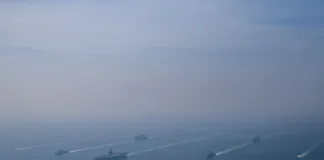Carlos Taylhardat | April 2025
The U.S. Navy says it destroyed a Venezuelan “go-fast” boat linked to Tren de Aragua, killing 11 suspected traffickers. Supporters call it a counter-narco victory; critics call it extrajudicial overreach. At stake: how far America can go in the name of security.
Context: Strike at Sea
On April 2, 2025, the White House released footage claiming U.S. forces destroyed a “go-fast” boat carrying drugs north from Venezuela. President Trump said: “We just, over the last few minutes, literally shot out a boat, a drug-carrying boat. The strike resulted in 11 terrorists killed in action.” (Reuters)
The administration said those aboard were members of Tren de Aragua (TdA), a Venezuela-origin criminal network now designated a Foreign Terrorist Organization/Specially Designated Global Terrorist group. (Federal Register)
Venezuela’s government rejected the footage as “generated by artificial intelligence” and said Washington had fabricated the strike.
Narrative One: A Counter-Narco Victory
Supporters frame the strike as a necessary escalation against narco-terror groups:
- Lives saved. Officials argue lethal interdiction disrupts cartels fueling the fentanyl crisis and hemispheric violence. Narco-terrorists, they say, are not ordinary smugglers.
- Deterrence. Publicizing the strike warns cartels and governments that maritime smuggling now risks destruction, not just Coast Guard seizures.
- Legal backdrop. With Tren de Aragua formally designated and Venezuela tied to regional threats, the administration says it has clear authority. (Federal Register)
“We just… shot out a boat, a drug-carrying boat.” — President Donald Trump (Reuters)
Narrative Two: Legal Overreach
Critics argue the strike crosses legal and ethical lines:
- Due process. Suspected drug trafficking is not a death-penalty offense. Analysts say lethal force should follow warning shots, boarding attempts, or disabling fire.
- Proof disputed. Caracas said the video was “AI-generated” and demanded evidence. Even if authentic, edited clips rarely show whether lawful escalation occurred. (Reuters)
- Dangerous precedent. Treating cartels as wartime targets risks normalizing extrajudicial killings outside battlefields and invites diplomatic retaliation.
“‘Being suspected of carrying drugs’ doesn’t carry a death sentence.” — Adam Isacson, security analyst
Narrative Three: The Silent Story
The overlooked issue is the blurred line between counter-narcotics and counterterrorism. Expanding “terrorist” designations to cartels allows the U.S. to act militarily without Congress—but it also erodes law-enforcement norms. The strike raises questions about evidence, proportionality, and whether global powers will adopt similar tactics.
Key Takeaways
- U.S. forces destroyed a Venezuelan “go-fast” boat on April 2, killing 11.
- White House says they were Tren de Aragua narco-terrorists.
- Venezuela disputes the strike, calling video “AI-generated.”
- Supporters frame it as a lifesaving deterrent; critics call it extrajudicial killing.
- Silent story: expanding terrorism designations blurs military and law-enforcement lines.
Questions This Article Answers
- What happened on April 2?
The U.S. says it destroyed a drug boat linked to Tren de Aragua, killing 11. - What did Venezuela say?
Officials claimed the video was fabricated and called for proof. - Why do supporters defend the strike?
They argue it deters cartels and saves lives during the fentanyl crisis. - Why do critics object?
They cite due process violations, proportionality, and risks of precedent. - What’s the bigger issue?
The broad use of terrorism designations to justify military action against criminal groups.
Sources & Related Reading
- Reuters – White House video claim
- Federal Register – Terrorist Designation
- EFF – TikTok Ban Concerns
- 3N – How to End the Fentanyl Crisis
- 3N – News by Algorithm
Carlos Taylhardat is the founder of 3 Narratives News, dedicated to presenting multiple perspectives on every story.


